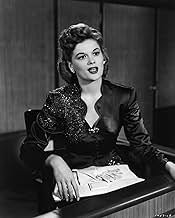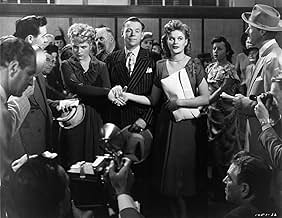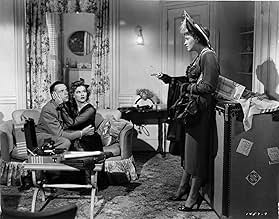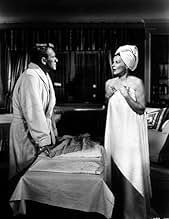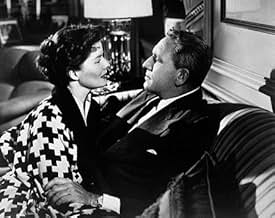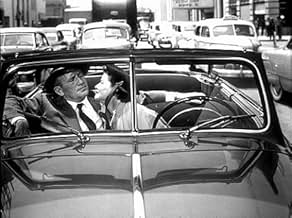Domestic and professional tensions mount when a husband and wife work as opposing lawyers in a case involving a woman who shot her husband.Domestic and professional tensions mount when a husband and wife work as opposing lawyers in a case involving a woman who shot her husband.Domestic and professional tensions mount when a husband and wife work as opposing lawyers in a case involving a woman who shot her husband.
- Nominated for 1 Oscar
- 3 wins & 5 nominations total
Edward Andrews
- Kip's neighbor
- (uncredited)
Bonnie Bannon
- Woman in Courtroom
- (uncredited)
Charles Bastin
- Young District Attorney
- (uncredited)
Harry Baum
- Commuter
- (uncredited)
Joseph E. Bernard
- Mr. Bonner - Adam's Father
- (uncredited)
- Director
- Writers
- All cast & crew
- Production, box office & more at IMDbPro
7.424.2K
1
2
3
4
5
6
7
8
9
10
Featured reviews
The Best of Hepburn and Tracy
Of the nine films which paired Spencer Tracy and Katherine Hepburn, Adam's Rib is often considered the best. Writers Ruth Gordon and Garson Kanin were friends of the famous couple and wrote the film specifically for them. Kate insisted the film be directed by her favorite screen director, George Cukor, who services the brilliant writing and on-screen chemistry with his trademark elegant staging and unobtrusive style. The result is a comedy that remains the best "battle of the sexes" films ever made.
When Doris Attinger (Judy Holliday) discovers her husband in the arms of another woman, she opens fire and is charged with attempted murder. Enter Adam and Amanda Bonner (Tracy and Hepburn), married lawyers whose lives are turned upside down when Adam is assigned to the prosecution. An ardent proponent of women's rights, Amanda decides to represent Doris, claiming that if the sex of the parties on trial were switched, the jury would feel differently. This conflict of interests creates friction in the courtroom as well as the Bonners' home.
Spencer Tracy, with his confident and relaxed screen presence, paints Adam as a man quite comfortable with his wife's force and ambition. But Adam grows upset with Amanda as the media spotlight finds the case and magnifies it into a cause for women's rights. He accuses Amanda with disregard for the law, reminding her that no one, man or woman, has the right to take the law into their own hands, and that Amanda is using the case for her own selfish purposes. The script is careful not to polarize Adam's interests. He reveres the law and has no special affection for Doris' husband. In opposing him, Katherine Hepburn manages to retain her signature strength while also portraying Amanda as a loving wife who fears the damage her marriage may sustain because of the case and its publicity. Amanda alleges that Doris is doomed to an unfair trial because the general public irrationally feels male infidelity is much more permissible than female infidelity.
The courtroom becomes a spectacle when Amanda puts a circus strong-woman on the stand and asks her to lift Adam. Tracy rises to the occasion, with an angry outburst that is empowered by his otherwise calm and restrained performance. Despite their marital bliss before the case, Adam admits that he likes "two sexes" and doesn't care for having a wife who is a "new woman" and a "competitor". This rare outpouring causes Amanda to realize just how personally Adam is taking the trial, and that it could result in their divorce.
Ruth Gordon and Garson Kanin deserve special recognition for creating a balanced on-screen battle in what has always been a controversial debate - gender equality. Amanda's plight is shaded by her experiences as a woman, and Adam is presented as a man who admits to always trying to hear her side of the story. That their marriage was a happy one before the trial is an indication of the equality they had achieved together. Amanda is, in fact, equal to Adam in both the career and financial worlds. To create a sparring partner for Amanda, Gordon and Kanin could easily have presented a misogynist, or even a lovable but cantankerous traditionalist. They were wiser to portray Adam as a man who simply refused to see the case as one for gender equality, but for vigilantism.
As directed by George Cukor, Adam's Rib features a great many long takes that play uninterrupted. Even during moments of action, like the scene in which both Bonners are getting dressed for dinner, Cukor utilizes minimal staging and camera movement. The camera points directly across the Bonners' bedroom, with her dressing room off frame left and his off frame right. They shout at each other, poking their heads into the frame, occasionally walking through the frame and back again. And later, when Adam discovers Kip and Amanda together, the ensuing fight is framed similarly, with the camera looking down the apartment hallway, characters popping into frame from the left or right and back again. This isn't to say Cukor doesn't move his camera much. There are several decisive camera movements, but Cukor's sparing use of them, and his tendency to rely more on well-composed master angles gives the film an elegant, traditional Hollywood style. The film also benefits from a lively score by Mikos Rozsa and a catchy Cole Porter tune, "Farewell Amanda". Jean Hagen, unforgettable for her comic turn in Singin' in the Rain, again demonstrates her talent for comedy as the "other woman".
Cukor must have realized that with Tracy and Hepburn on screen, all the camera really had to do was follow them, frame them, and let the sparks fly.
The screenplay and the actors' off-screen romance are gifts to the film. We feel for both of them, and believe in what both are trying to achieve. It is rare that a film about difference and equality plays so fairly to all parties involved, and also rare that such a sensitive subject can retain its comic appeal. But for all the film says about equality, Adam's Rib ultimately serves to remind us that when it comes to Hepburn and Tracy, there is no equal. - Scott Schirmer
When Doris Attinger (Judy Holliday) discovers her husband in the arms of another woman, she opens fire and is charged with attempted murder. Enter Adam and Amanda Bonner (Tracy and Hepburn), married lawyers whose lives are turned upside down when Adam is assigned to the prosecution. An ardent proponent of women's rights, Amanda decides to represent Doris, claiming that if the sex of the parties on trial were switched, the jury would feel differently. This conflict of interests creates friction in the courtroom as well as the Bonners' home.
Spencer Tracy, with his confident and relaxed screen presence, paints Adam as a man quite comfortable with his wife's force and ambition. But Adam grows upset with Amanda as the media spotlight finds the case and magnifies it into a cause for women's rights. He accuses Amanda with disregard for the law, reminding her that no one, man or woman, has the right to take the law into their own hands, and that Amanda is using the case for her own selfish purposes. The script is careful not to polarize Adam's interests. He reveres the law and has no special affection for Doris' husband. In opposing him, Katherine Hepburn manages to retain her signature strength while also portraying Amanda as a loving wife who fears the damage her marriage may sustain because of the case and its publicity. Amanda alleges that Doris is doomed to an unfair trial because the general public irrationally feels male infidelity is much more permissible than female infidelity.
The courtroom becomes a spectacle when Amanda puts a circus strong-woman on the stand and asks her to lift Adam. Tracy rises to the occasion, with an angry outburst that is empowered by his otherwise calm and restrained performance. Despite their marital bliss before the case, Adam admits that he likes "two sexes" and doesn't care for having a wife who is a "new woman" and a "competitor". This rare outpouring causes Amanda to realize just how personally Adam is taking the trial, and that it could result in their divorce.
Ruth Gordon and Garson Kanin deserve special recognition for creating a balanced on-screen battle in what has always been a controversial debate - gender equality. Amanda's plight is shaded by her experiences as a woman, and Adam is presented as a man who admits to always trying to hear her side of the story. That their marriage was a happy one before the trial is an indication of the equality they had achieved together. Amanda is, in fact, equal to Adam in both the career and financial worlds. To create a sparring partner for Amanda, Gordon and Kanin could easily have presented a misogynist, or even a lovable but cantankerous traditionalist. They were wiser to portray Adam as a man who simply refused to see the case as one for gender equality, but for vigilantism.
As directed by George Cukor, Adam's Rib features a great many long takes that play uninterrupted. Even during moments of action, like the scene in which both Bonners are getting dressed for dinner, Cukor utilizes minimal staging and camera movement. The camera points directly across the Bonners' bedroom, with her dressing room off frame left and his off frame right. They shout at each other, poking their heads into the frame, occasionally walking through the frame and back again. And later, when Adam discovers Kip and Amanda together, the ensuing fight is framed similarly, with the camera looking down the apartment hallway, characters popping into frame from the left or right and back again. This isn't to say Cukor doesn't move his camera much. There are several decisive camera movements, but Cukor's sparing use of them, and his tendency to rely more on well-composed master angles gives the film an elegant, traditional Hollywood style. The film also benefits from a lively score by Mikos Rozsa and a catchy Cole Porter tune, "Farewell Amanda". Jean Hagen, unforgettable for her comic turn in Singin' in the Rain, again demonstrates her talent for comedy as the "other woman".
Cukor must have realized that with Tracy and Hepburn on screen, all the camera really had to do was follow them, frame them, and let the sparks fly.
The screenplay and the actors' off-screen romance are gifts to the film. We feel for both of them, and believe in what both are trying to achieve. It is rare that a film about difference and equality plays so fairly to all parties involved, and also rare that such a sensitive subject can retain its comic appeal. But for all the film says about equality, Adam's Rib ultimately serves to remind us that when it comes to Hepburn and Tracy, there is no equal. - Scott Schirmer
Classic 'Battle of the Sexes' is a Sheer Joy!
'Adam's Rib' is arguably the greatest Tracy-Hepburn film, and is certainly the most popular of their teamings. Brightly written (by the husband and wife team of Ruth Gordon and Garson Kanin), it takes the premise of a wife (the sparkling Judy Holliday, in her film debut) on trial for shooting her unfaithful husband (Tom Ewell, establishing himself in the kind of role he'd reprise in The Seven-Year Itch), and turns it into a forum of the sexual values and standards of the 1940s, and a showcase for the fabulous Tracy and Hepburn, who were were never better than as the battling D.A. and defense attorney. In the courtroom and out, the love they share, and tweaking of each other's egos is a sheer joy to watch. That the story is also a knowing commentary about women's inequality under the law makes the film even more topical today, and doesn't reduce the film's enjoyment value at all. It is a VERY funny film, and can be enjoyed at MANY levels!
In addition to Holliday and Ewell, the supporting cast includes the terrific David Wayne as a smarmy songwriter-neighbor who covets Hepburn, and 'writes' the ditty 'Goodbye, Amanda' for her (actually composed by Cole Porter, Hepburn's character's name in the film was changed to Amanda, to fit the song!)
Among the many wonderful scenes of the film are the 'home movie', which accurately reflected much of Tracy and Hepburn's own relationship; the infamous massage scene ("I know a slap...!"); the circus 'Strong Woman', demonstrating that women can be as physically powerful as men by lifting the panicking Tracy over her head easily (in the middle of the courtroom!); the infamous licorice-gun confrontation as Tracy confronts Hepburn with Wayne; and Tracy's crying-on-demand revelation.
'Adam's Rib' is a film which never seems to age, but just gets better and better!
In addition to Holliday and Ewell, the supporting cast includes the terrific David Wayne as a smarmy songwriter-neighbor who covets Hepburn, and 'writes' the ditty 'Goodbye, Amanda' for her (actually composed by Cole Porter, Hepburn's character's name in the film was changed to Amanda, to fit the song!)
Among the many wonderful scenes of the film are the 'home movie', which accurately reflected much of Tracy and Hepburn's own relationship; the infamous massage scene ("I know a slap...!"); the circus 'Strong Woman', demonstrating that women can be as physically powerful as men by lifting the panicking Tracy over her head easily (in the middle of the courtroom!); the infamous licorice-gun confrontation as Tracy confronts Hepburn with Wayne; and Tracy's crying-on-demand revelation.
'Adam's Rib' is a film which never seems to age, but just gets better and better!
Clumsy comedy for lack of focus
You're disappointed when the premise sounds good but the movie looks weak. Adam's Rib has a too serious background translated in too many talks. Basically that's what makes the movie a poor comedy with only a few laughs.
To go further in the analysis I would say the Hepburn-Tracy couple is over-stretched between private life/social life/professional life. This narrative stretching is only here to show feminism under a comprehensive focus. The outcome is the domestic comedy and the feminist cause cannibalize each other.
For great comedies, prefer the pairing of Ms Hepburn with Cary Grant: Bringing up Baby (delightfully over the top), Holiday or the Philadelphia Story (where Cukor masters in mixing serious issues with good laughs).
To go further in the analysis I would say the Hepburn-Tracy couple is over-stretched between private life/social life/professional life. This narrative stretching is only here to show feminism under a comprehensive focus. The outcome is the domestic comedy and the feminist cause cannibalize each other.
For great comedies, prefer the pairing of Ms Hepburn with Cary Grant: Bringing up Baby (delightfully over the top), Holiday or the Philadelphia Story (where Cukor masters in mixing serious issues with good laughs).
10Cinemayo
Adam's Rib (1949) ****
Spencer Tracy and Katharine Hepburn make fireworks in this cute film about a well-to-do married couple who both happen to be lawyers. Hepburn is a die-hard Woman's Rights supporter, so when a ditzy lady is charged with shooting her husband after catching him being unfaithful, Kate decides to take her case and defend her. The trouble is, old-fashioned husband Tracy is already penciled in as the prosecuting attorney. Let the Battle of the Sexes begin!
The script sets up a great opportunity to have Tracy and Hepburn sparring with one another during every phase of the trial, as well as at home every night after they've spent each day trying to outwit each other. As a comedy, there aren't any huge belly-laughs, but it's a charming enough little take on the differences between men and women which also manages to make the point that, in many ways, the sexes aren't really all that different when all is said and done.
**** out of ****
The script sets up a great opportunity to have Tracy and Hepburn sparring with one another during every phase of the trial, as well as at home every night after they've spent each day trying to outwit each other. As a comedy, there aren't any huge belly-laughs, but it's a charming enough little take on the differences between men and women which also manages to make the point that, in many ways, the sexes aren't really all that different when all is said and done.
**** out of ****
Cheeky magnetic romp saying far more than was thought back in the day.
Adam's Rib turned out to be a delightfully cheeky romp with a kicker sense of humour, all acted out with ease by Spencer Tracy & Katherine Hepburn. I love how the film veers from the courtroom right into their marital home and becomes not just about a battle of wills, but a battle of the sexes as well, much fun watching this famous couple go at each other, both at work and at home. The film benefits greatly from the appearance of the lovely Judy Holliday in her breakthrough role, and it amused me greatly to see David Wayne playing a shifty character as I remember him fondly from the Twilight Zone episode Escape Clause in 1959. 8/10
Did you know
- TriviaInspired by the real-life story of husband-and-wife lawyers William Dwight Whitney and Dorothy Whitney, who represented Raymond Massey and his ex-wife Adrianne Allen in their divorce. After the Massey divorce was over, the Whitneys divorced each other and married the respective Masseys.
- GoofsDuring the trial proceedings, a Black juror was in the first row, but the trial scene following the argument between Amanda and Adam where Adam walks out of the home, the jury makeup has now changed and the Black juror is not present. However the following day when court resumes for the jury verdict, the Black juror is back in the jury box.
- Crazy creditsOpening credits are little curtains that go up and down, on a stage in a performance hall.
- Alternate versionsAlso available in a computer colorized version.
- ConnectionsEdited into Hollywood: The Dream Factory (1972)
- SoundtracksFarewell, Amanda
(1949)
Music and Lyrics by Cole Porter
Played during the opening credits and often in the score
Sung by David Wayne (uncredited), accompanying himself on the piano
Reprised by the voice of Frank Sinatra (uncredited) on the radio
Whistled by Katharine Hepburn (uncredited)
Sung a cappella by Spencer Tracy (uncredited)
Details
- Runtime
- 1h 41m(101 min)
- Color
- Aspect ratio
- 1.37 : 1
Contribute to this page
Suggest an edit or add missing content



